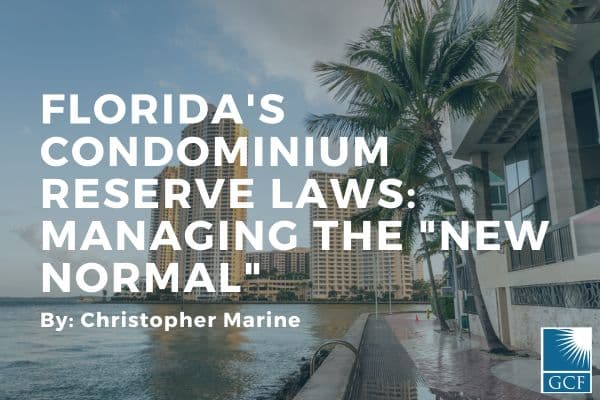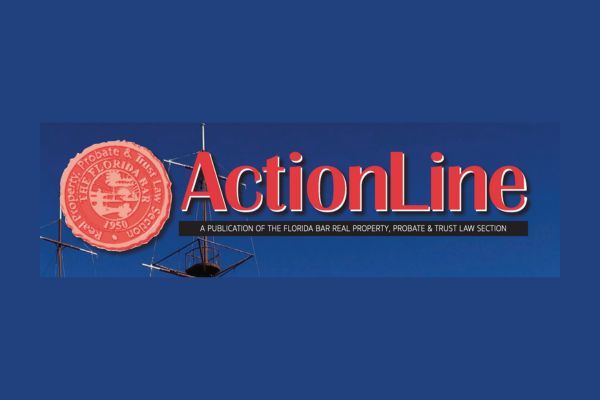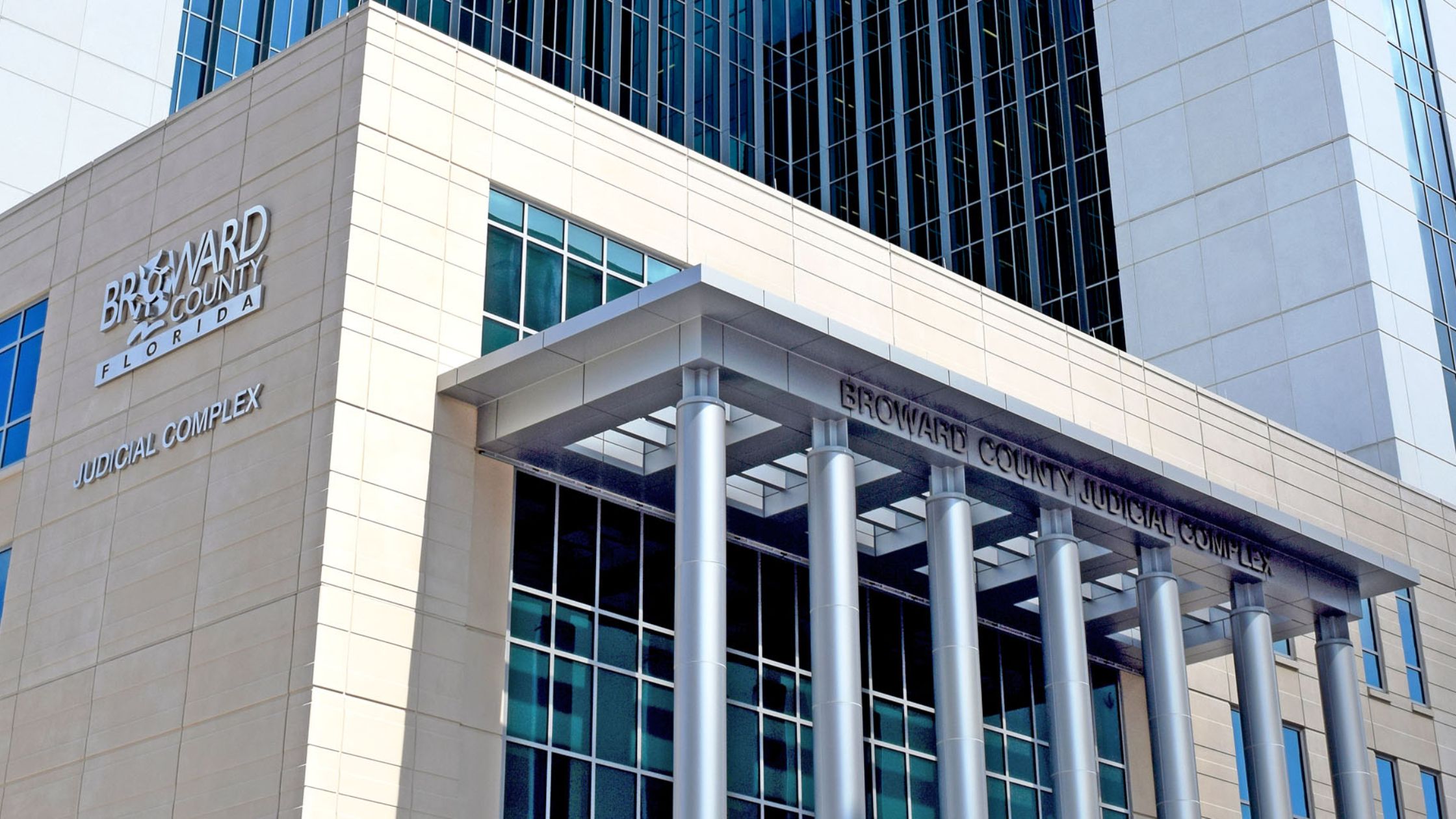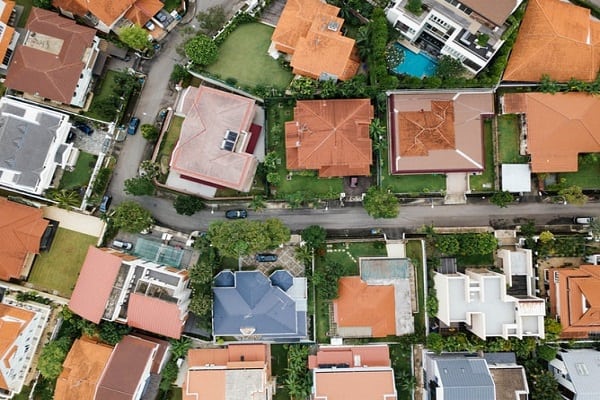Recent amendments to Florida’s condominium reserve statutes may engender dramatic impacts to condominium values. Condominium owners, prospective purchasers and real estate agents should become informed and knowledgeable with this new legislation, and its potentially sweeping effects upon purchase and sale transactions.
This article will briefly review the new legislation, and present a current, pending transaction handled by a Gould Cooksey Fennell real estate attorney to demonstrate the broad scope of these legislative impacts upon negotiations, purchase and sale prices and condominium ownership. Those who are unaware of the introduction of this new element into condominium resale transactions may overpay to acquire a condominium unit, and later risk great additional expense after closing, as Associations force unit owner compliance.
New Mandatory Duties to Maintain Reserves
A central element of the new legislation is the creation of a mandatory duty upon Condominium Associations to maintain reserves for future capital expenditures and deferred maintenance. Passage of these new statutes is essentially a legislative reaction to the unexpected, disastrous collapse of the Champlain Towers Condominium building in Surfside, Florida which occurred in the summer of 2021 and resulted in the deaths of nearly 100 people. The Florida legislature instituted these new legal requirements as a measure to protect public health, safety and welfare.
Structural Inspections & Reserve Studies
The new legislation imposes duties upon Associations in older condominiums to conduct comprehensive structural inspections to assess the existence and scope of possible structural deterioration in condominium buildings. These inspections must be performed by professional engineers or architects, and include building structural walls, floors, roofs, foundations, fire protection systems, utility systems and windows.
Associations are also required to perform structural integrity reserve studies, the purpose of which is to determine the reserve funds which will be required to pay for future major repairs and replacement of common area improvements that may be necessary. The studies must also identify the recommended annual reserve amounts which must be collected from condominium unit owners, so adequate funds are available when the work becomes necessary.
As noted above, Condominium Associations managing older condominiums are now legally required to budget for and maintain reserve funds as a long-term planning tool to discharge future expenses. Historically, Associations could elect to reduce or totally waive reserves, and it was legally permissible to do so. The practical effect of this action kept unit owner assessments lower, but left the condominium underfunded or completely unfunded relative to long term capital expenditures. Associations had the legal option to either “pay now or pay later” relative to funding reserves. Again, while permissible in the past, this practice could place an enormous financial strain on unit owners in the form of large assessments when capital improvements became necessary, but had never been funded.
The new legislation puts an end to this historic option to “pay now or pay later”, and creates mandatory legal requirements upon projects 25 years or older to ascertain, budget for and fund these future activities. Unit owners, and the Associations that administer condominiums of heights three stories and greater, are required to “pay now”, so the financial resources are available later when the corrective or remedial work must be performed.
Mandatory Equalization of Underfunded Reserves
The new statutes also require Associations to play catch up in terms of funding the reserve accounts which will be used to discharge future capital expenditures. Equalizing insufficient and inadequate reserves with future anticipated repair expenses is a duty placed directly upon unit owners in the form of increased assessments and special assessments.
This new market reality must be addressed at the time a buyer or his/her real estate agent is negotiating a unit purchase. If this does not occur, the purchaser will inherit this responsibility, and potentially significant monetary expense after closing to pay for required capital improvements.
This future exposure can be analyzed, assigned a value, and factored into a reduction of the purchase price offered for the unit. If not, a purchaser may “pay now and pay later”.
Managing The “New Normal”
As an illustrative example, reference is made to an actual 2023 condominium resale transaction which was deftly and expertly handled by a real estate agent in our community well-versed with the new legislation. The transaction involves an oceanfront condominium in an older, but well-maintained project in Indian River County. The unit itself had beautiful views of the Atlantic Ocean and the Barrier Island coast. The owner kept the unit in a superior condition, and decided to list at an asking price of nearly $1.7M.
Absent the application of the new legislation, this listing price was spot on, and was likely to have been achieved by the owner at sale. The selling agent conducted an analysis of the structural integrity inspection reports prepared by professionals for the Association, along with the estimated expenses and timing to perform the planned future improvements.
The agent determined that available reserves were highly deficient and underfunded. To equalize the Association’s reserve funds with the expense anticipated by the required remedial work, mandatory special assessments were planned to be levied on all unit owners over the next 2-3 years. Faced with these extensive future assessments, the owner agreed to reduce the list price of the unit in an amount anticipated to account for the unit’s share of the future assessments.
The purchasing party ultimately acquired the unit for around $1M, nearly a $700,000 deduction from the list price. Interestingly, the seller did not characterize the price reduction as a lowball or fire sale offer, due to the attendant facts. Had the buyer and the real estate agent omitted this critical analysis, the buyer would have overpaid for the unit, and suffered several hundreds of thousands of special assessment responsibilities in the years following the purchase. Application of this analysis revealed the flaw in an otherwise accurate listing price.
The above example represents the “perfect storm” of an older project, a highly deficient existing reserve account, and a considerable amount of necessary remedial work. The required remedial activities for the condominium included a complete new roof system, reconditioning a covered garage below the units, and significant concrete restoration work to maintain structural integrity of the building, seawall, and other amenities. The available reserve funds held by the Condominium Association represented less than 20% of the required expense. The combination of these factors, and the great expense to perform the repairs, created a pending financial burden which in turn must be passed along to unit owners.
Seek Professional Assistance If You Are Considering Purchasing a Condo in Florida
Adoption of the new legislation governing Condominium Association reserves should prove to be a highly beneficial measure to protect condominium ownership and safety, and preserve consumer investments in condominium living. However, its impact and effect upon condominium owners, purchasers and real estate agents engaged in condominium unit transactions cannot be overstated.
If you are considering a condominium as an investment, a vacation residence or perhaps a retirement choice, don’t “pay now and pay later”. Seek the assistance of skilled professionals to aid your analysis and avoid surprise expenses after your purchase.
During the negotiation process, buyers and agents should insist upon receiving copies of the Association’s current structural inspection report and reserve study for the building, if available, along with the Minutes of the previous Annual Meeting of the Condominium Association. Inspection and statutory rescission periods should also be extended, to permit sufficient time to analyze and apply this information to the pricing determination. Condominium owners should make an effort to inform themselves about how this new legislation may impact their buildings. Owners should inquire of their Condominium Associations or management companies to confirm that appropriate and timely measures are being undertaken to achieve compliance with these new mandatory responsibilities.
Gould Cooksey Fennell real estate attorneys can be an integral part of your professional team, supporting a knowledgeable, informed purchase or sale decision.








